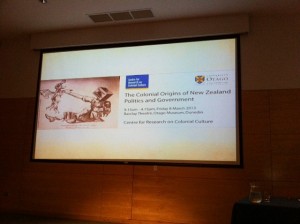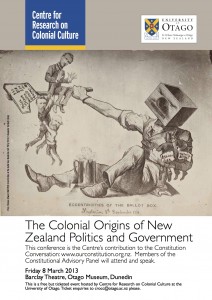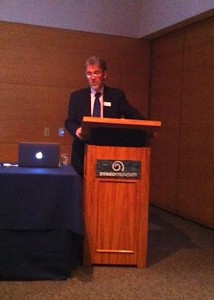James Cowan Symposium
A reminder that abstracts for the James Cowan Symposium (to be held in early 2014), co-hosted by the Centre for Research on Colonial Culture and the Alexander Turnbull Library, are due by 30 September. More details about the event can be accessed here: Cowan Symposium ePoster
Warm Welcome to Dr. Samia Khatun
The Centre for Research on Colonial Culture is pleased to announce that Dr Samia Khatun will be based in Dunedin from September 2013 to February 2014 as a guest of CRoCC.
Samia completed her PhD at the University of Sydney, where her research examined cultural encounters and translation in the Australian interior using both Aboriginal and South Asian language materials. She has held a postdoctoral fellowship at Zentrum Moderner Orient (ZMO), Berlin and has recently completed a residency at the Asian-American Writers Workshop, New York, USA. Samia is also an accomplished film maker.
While in Dunedin she will be completing her book manuscript Camels, Ships and Trains: Australia in an Indian Ocean Context.
Visiting Speakers
This week CROCC is co-sponsoring two visiting speakers. The first is Professor A. R. Venkatachalapathy (Madras Institute of Development Studies), who will deliver an open lecture entitled, “The Birth of the Tamil Author” today (September 2) at 5.15pm (Archway 2). Professor Venkatachalapathy is a leading expert on print culture in south India.
On Thursday 5 September we are co-sponsoring a lecture by Professor Luke Gibbons (NUI Maynooth), a leading Irish cultural critic and literary scholar. Professor Gibbons will be speaking on “Limits of the Visible: Representing the Great Irish Famine” at 5.15pm in Burns 5.
Please do come along!
Cowan Symposium Call-for-Papers
Call for Papers
New Perspectives on James Cowan
A One-Day Symposium
Centre for Research on Colonial Culture and the Alexander Turnbull Library
National Library, Wellington, 21 February 2014
James Cowan is best known for his official history of the New Zealand Wars, but his significance for the production and circulation of knowledge about Māori in the late colonial era covered a broad range of subjects. Alan Mulgan wrote after Cowan’s death in 1943 that more than anyone else, he had ‘shown us how to think as New Zealanders’. Mulgan signaled here not only Cowan’s prolific writing, but also his cross-cultural engagement from the 1890s to the 1940s. He was himself a figure of the type he so admired: the cultural go-between. Although his work often purveys the racial ideologies of his time, Cowan’s early use of oral historical methods, and familiarity with a wide range of Māori informants, effected the transition to print of much that would not otherwise have been circulated in Pākehā contexts, or recorded in print.
Cowan’s reputation has fluctuated in response to shifts in cultural politics, writing and historiography. His work began to attract contemporary scholarly attention with an article by Chris Hilliard in NZJH in 1997. Stories of the New Zealand Bush has been republished recently with a critical introduction by Alex Calder. The Adventures of Kimble Bent was read on National Radio in 2011, and re-written as a graphic novel, and film-makers have drawn on his work over decades. Some dimensions of Cowan’s work invite closer study: his significance for iwi history, his photographic collection, and the personal life of this particularly colonial figure, for example, would repay investigation.
For this one-day event, we invite papers which evaluate Cowan’s contribution to colonial encounter and colonial memory from a wide range of perspectives.
Please send abstracts (up to 250 words) and a bio (up to 100 words) in a Word attachment, by 30 September 2013.
Abstracts and enquiries should be sent to: cowan.symposium@otago.ac.nz
Further information about the symposium will be forthcoming.
Associate Professor Chris Hilliard, University of Sydney, will give a concluding commentary.
Convenors
Annabel Cooper (Centre for Research on Colonial Culture, U of Otago)
Ariana Tikao (Research Librarian, Māori, Alexander Turnbull Library),
Paper Work
Professor Tony Ballantyne (Otago) and Associate Professor Craig Robertson (Northeastern University), who is spending his sabbatical in the Department of History and Art History, have organised two events that explore the history and meaning of paper work.
On Thursday evening 23 May (5.30 Burns 2) the distinguished media historian Professor Lisa Gitelman (NYU) will deliver a public lecture entitled the ‘The Social Life of Paper’.
On Friday 24 May there will be a one day research symposium at the Hocken Collections on ‘Paper Work: The Materials and Practices of Modern Information Cultures’. The programme is below. Please email Tony if you would like to attend: tony.ballantyne@otago.ac.nz
Paper Work: The Materials and Practices of Modern Information Cultures
9.20am: Welcome
9.30-11.45am
Barbara Brookes, Committed by Paper: Incoherence and Accountability in the Seacliff Asylum Files
Jane McCabe, The Kalimpong Files: Private and Confidential
1.30-3.00pm
Stephen Robertson (University of Sydney), Private Detectives and the Paper Work of Surveillance in the US, 1855-1939
Craig Robertson (Northeastern University), Handling Information: File Clerks, Efficiency, and the Emergence of the Modern Office
3.15-4.45pm
Tim Rowse (University of Western Sydney), Tabulating Indigenous Populations: Colonial Knowledge in Two Dimensions
Tony Ballantyne, Paper and the Work of Empire: Bureaucracy and British Colonialism
CFP: Collectors, Collecting and Collections
Collectors/Collecting/Collections
A Call for Papers
The Centre for the Book at the University of Otago will be holding a two day symposium on Collectors/Collecting/Collections on 17 & 18 October 2013.
On the evening of 17 October in the Dunningham Room, Dunedin Public Library, Jim E. Traue, ex-Turnbull Librarian, Wellington, will give an open lecture entitled: ‘Treasured up on purpose to a life beyond life’.
The Symposium proper will begin at 10.00 on 18 October at the Auditorium, Toitū Early Settlers Museum. It will finish at 5.00 pm.
*
There is no end to collecting. There are collectors of the first editions or earliest printings of various works of literature, history, science, and philosophy; of bibles, children’s books, travel books, and almanacs; and still others ranging from limited private press productions to collectors of manuscripts and illustrated books. There are also those who collect thimbles, decorative teaspoons, cakes tins, art, motorcycles, and a whole lot more.
The methods by which collectors amass their materials are equally varied, including through catalogue, auction, gifts, and e-sites like Trademe and abebooks.com. Indeed, by accumulating such items, the question arises: what constitutes a collection? Is it a disparate mass of stuff, or something much more organised?
Institutions throughout New Zealand have been fortunate to benefit from collectors such as Alexander Turnbull, Sir George Grey, A. H. Reed, and Dr Hocken, to name but a few. Their collections are in the public domain for all to use and enjoy; we would be much poorer without their efforts. There are, however, those that are lost, such as General Robley’s moko collection, and Rex Nan Kivell’s New Zealand-related collection (now in Australia). And what of the future? Will institutions continue to receive collections from generous public-spirited collectors, or will they disperse them to the four winds, for others to enjoy?
If you would like to participate in this symposium, which we hope will be wide ranging, please send your abstracts to Dr Shef Rogers, English Department, University of Otago (shef.rogers@otago.ac.nz) or Dr Donald Kerr, Special Collection Librarian, University of Otago (Donald.kerr@otago.ac.nz) by 31 August 2013.
Registration for the full day will be $25 (waged); $10 (unwaged). Details of how to register will be notified on the Centre’s website closer to the event.
CFP: New Zealand Historical Association Conference
The biennial New Zealand Historical Association conference is being held in Dunedin from Wednesday 20 November until Friday 22 November.
Keynote Speakers are:
Colonial Origins of NZ Politics and Government
 On Friday March 8th, members of the Centre gave presentations on aspects of the colonial origins of New Zealand politics and government. This was our contribution to the “conversation” with the Constitutional Advisory Panel, a body established by the government to canvass public views on the constitution. This was a public event, held at the Otago Museum, and attended by a variety of people throughout the day. Present were two panel members, Peter Chin and Sir Tipene O’Regan, and the panel’s administrative organiser, Lison Harris.
On Friday March 8th, members of the Centre gave presentations on aspects of the colonial origins of New Zealand politics and government. This was our contribution to the “conversation” with the Constitutional Advisory Panel, a body established by the government to canvass public views on the constitution. This was a public event, held at the Otago Museum, and attended by a variety of people throughout the day. Present were two panel members, Peter Chin and Sir Tipene O’Regan, and the panel’s administrative organiser, Lison Harris.
Professor Tony Ballantyne, the Centre director, welcomed those attending, and this was followed by talks on theimpact of religion (Assoc Prof John Stenhouse); the political aspirations of early colonists (Prof Ballantyne); how rangatiratanga was understood in the colonial period (Dr Lachy Paterson); Māori voting patterns (Dr Paerau Warbrick-Anderson); iwi and the state (Dr Michael Stevens); the making of modern politics (Prof Tom Brooking); and the relationship between art and politics (Assoc Prof Mark Stocker). To round off the day, Sir Tipene O’Regan and Prof Erik Olssen offered their thoughts on the day’s events.
Check out more images here on the Department of History and Art History Facebook page.
Constitutional Conversation
 The Centre for Research on Colonial Culture is holding a one-day symposium at the Otago Museum (Barclay Theatre) on Friday 8 March. The speakers in this event will reflect on New Zealand’s political history and its constitutional development. This symposium is designed to cast new light on important historical questions but it also functions as the Centre’s contribution to the ‘Constitutional Conversation’. Members of the Constitutional Advisory Panel (CAP) will be attending and Sir Tipene O’Regan, co-chair of CAP, will participate in the final discussion session. This event is open to the public and there is no registration fee: morning and afternoon tea will be provided (but not lunch). But entrance will be by ticket only as space is restricted. If you want a ticket please email <crocc@otago.ac.nz> – there is limited space and tickets will be issued on a first come, first served basis.
The Centre for Research on Colonial Culture is holding a one-day symposium at the Otago Museum (Barclay Theatre) on Friday 8 March. The speakers in this event will reflect on New Zealand’s political history and its constitutional development. This symposium is designed to cast new light on important historical questions but it also functions as the Centre’s contribution to the ‘Constitutional Conversation’. Members of the Constitutional Advisory Panel (CAP) will be attending and Sir Tipene O’Regan, co-chair of CAP, will participate in the final discussion session. This event is open to the public and there is no registration fee: morning and afternoon tea will be provided (but not lunch). But entrance will be by ticket only as space is restricted. If you want a ticket please email <crocc@otago.ac.nz> – there is limited space and tickets will be issued on a first come, first served basis.
Research Seminar on Transnational Indigenous Women’s Activism
On March 1st the Centre for Research on Colonial Culture will co-host a research seminar by visiting scholar Professor Margaret D. Jacobs, University of Nebraska. Her seminar is entitled: “Transnational Indigenous Women’s Activism and the Indigenous Child Welfare Crisis, 1960-1980s.’


